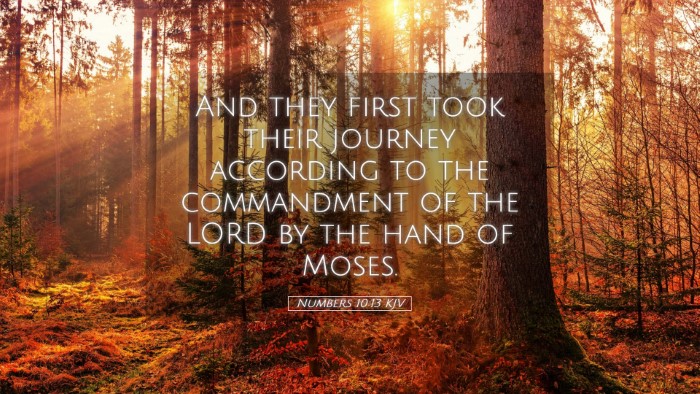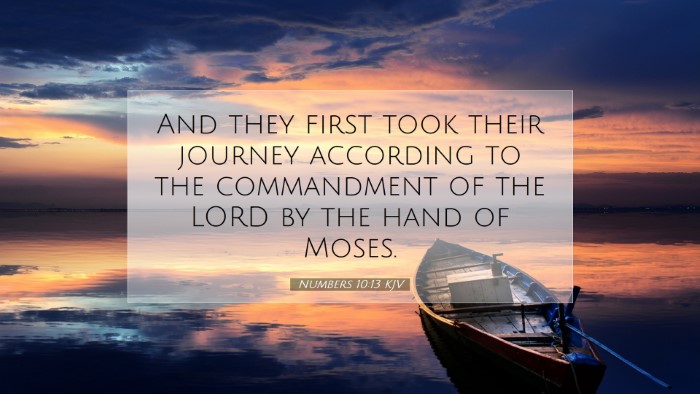Commentary on Numbers 10:13
Bible Verse: "And they first took their journey according to the commandment of the LORD by the hand of Moses."
Introduction
The journey of the Israelites as recorded in the book of Numbers is rich with theological significance and practical application. Numbers 10:13 serves as a transitional verse that highlights the obedience of the Israelites to God's command through Moses, marking a pivotal moment in their journey through the wilderness. This commentary synthesizes insights from Matthew Henry, Albert Barnes, and Adam Clarke to provide a deeper understanding of this verse.
The Context of Numbers 10
Before diving into this specific verse, it is essential to grasp the broader context. The book of Numbers is named for the censuses taken of the Israelite population and serves to document their progression from Mt. Sinai, through the wilderness, to the brink of the Promised Land. Chapter 10 marks a significant point in Israel's transition from stationary to mobile as they begin their journey in earnest.
- Calling and Commissioning: This journey follows the establishment of the Levitical priesthood and the construction of the Tabernacle, which signifies God’s presence among His people.
- Significance of the Silver Trumpets: The use of trumpets indicates a divine summons to assemble, reinforcing the importance of communal obedience and readiness.
Insights from Commentators
Matthew Henry
Matthew Henry emphasizes the theme of obedience in this verse, noting that the Israelites' march represents their faith and reliance on God's direction. He highlights several key points:
- Divine Command: The phrase "according to the commandment of the LORD" underlines the absolute necessity of obedience to God's word, a central theme throughout Scripture. Henry articulates that the faithful observance of God's commands is crucial for the success of any spiritual journey.
- Leadership of Moses: Moses' role as a mediator between God and the people is pivotal. Henry points out that it was by the "hand of Moses" that God’s directives were executed, highlighting the importance of divinely appointed leaders.
- Collective Movement: The communal aspect of the Exodus emphasizes that believers are called to walk in unity, following God's guidance together, thus reinforcing the significance of body life within the church.
Albert Barnes
Albert Barnes offers a detailed examination of the implications of this march as it pertains to the covenant relationship between God and Israel. His points include:
- Faithfulness of God: Barnes notes that God's command signifies His faithfulness to His promises. The journey initiated by divine command reassures the Israelites that they are not abandoned but are under God's continual guidance.
- Preparation for the Journey: He stresses the importance of being spiritually prepared for the journey ahead, as this act signifies not merely physical movement but a spiritual pilgrimage, emphasizing readiness to receive future revelations from God.
- The Purpose of the Journey: This movement foreshadows the fulfillment of God's promise to lead His people to a land flowing with milk and honey, symbolizing spiritual abundance and divine inheritance.
Adam Clarke
Adam Clarke provides a practical perspective, linking this historical event to the believer's life today:
- Guidance of the Holy Spirit: Clarke relationally parallels the Israelite journey with the Christian pilgrimage emphasizing the essential role of the Holy Spirit in guiding believers in their spiritual endeavors.
- The Call to Action: He remarks on the necessity of responding to God’s call with urgency. Just as the Israelites moved at God's directive, believers today must be ready to obey promptly when God issues a directive.
- Reflection on Leadership: Clarke addresses the necessity of having godly leaders like Moses who are attuned to God’s voice, reinforcing the idea that the community's direction is often reflected through its leaders’ spirituality and obedience.
Theological Implications
This verse encapsulates profound theological implications regarding God’s sovereignty, human obedience, and communal identity:
- Sovereignty of God: The emphasis on God's command indicates His initiative and authority over His people. The journey is not initiated by human desire but by divine directive.
- The Nature of Obedience: Obedience is presented as a fundamental aspect of the covenant community, illustrating how it is not merely a response to laws but a relational engagement with God.
- Community and Journey: The communal aspect of this narrative prompts reflection on the church's call to collectively follow God’s path, encouraging mutual accountability and support within the body of Christ.
Conclusion
Numbers 10:13 serves as a powerful reminder of the necessity of obedience to God’s commands as articulated through trusted leaders. The insights from Matthew Henry, Albert Barnes, and Adam Clarke encourage believers to reflect on their own spiritual journeys, recognizing the importance of divine guidance and the collective nature of faith. As we navigate our modern wilderness, let us remain attentive to the voice of God and ready to act according to His directives, assured of His faithful presence along the journey.


